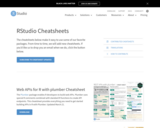
RStudio Cheatsheets
The cheatsheets below make it easy to use some of our favorite packages. Cheatsheets include the following topics:
Python with R and Reticulate Cheatsheet
The reticulate package provides a comprehensive set of tools for interoperability between Python and R. With reticulate, you can call Python from R in a variety of ways including importing Python modules into R scripts, writing R Markdown Python chunks, sourcing Python scripts, and using Python interactively within the RStudio IDE. This cheatsheet will remind you how.
Factors with forcats Cheatsheet
Factors are R’s data structure for categorical data. The forcats package makes it easy to work with factors. This cheatsheet reminds you how to make factors, reorder their levels, recode their values, and more.
Tidy Evaluation with rlang Cheatsheet
Tidy Evaluation (Tidy Eval) is a framework for doing non-standard evaluation in R that makes it easier to program with tidyverse functions. Non-standard evaluation, better thought of as “delayed evaluation,” lets you capture a user’s R code to run later in a new environment or against a new data frame. The tidy evaluation framework is implemented by the rlang package and used by functions throughout the tidyverse.
Deep Learning with Keras Cheatsheet
Keras is a high-level neural networks API developed with a focus on enabling fast experimentation. Keras supports both convolution based networks and recurrent networks (as well as combinations of the two), runs seamlessly on both CPU and GPU devices, and is capable of running on top of multiple back-ends including TensorFlow, CNTK, and Theano.
Dates and Times Cheatsheet
Lubridate makes it easier to work with dates and times in R. This lubridate cheatsheet covers how to round dates, work with time zones, extract elements of a date or time, parse dates into R and more. The back of the cheatsheet describes lubridate’s three timespan classes: periods, durations, and intervals; and explains how to do math with date-times.
Work with Strings Cheatsheet
The stringr package provides an easy to use toolkit for working with strings, i.e. character data, in R. This cheatsheet guides you through stringr’s functions for manipulating strings. The back page provides a concise reference to regular expresssions, a mini-language for describing, finding, and matching patterns in strings.
Apply Functions Cheatsheet
The purrr package makes it easy to work with lists and functions. This cheatsheet will remind you how to manipulate lists with purrr as well as how to apply functions iteratively to each element of a list or vector. The back of the cheatsheet explains how to work with list-columns. With list columns, you can use a simple data frame to organize any collection of objects in R.
Data Import Cheatsheet
The Data Import cheatsheet reminds you how to read in flat files with http://readr.tidyverse.org/, work with the results as tibbles, and reshape messy data with tidyr. Use tidyr to reshape your tables into tidy data, the data format that works the most seamlessly with R and the tidyverse.
Data Transformation Cheatsheet
dplyr provides a grammar for manipulating tables in R. This cheatsheet will guide you through the grammar, reminding you how to select, filter, arrange, mutate, summarise, group, and join data frames and tibbles.
Sparklyr Cheatsheet
Sparklyr provides an R interface to Apache Spark, a fast and general engine for processing Big Data. With sparklyr, you can connect to a local or remote Spark session, use dplyr to manipulate data in Spark, and run Spark’s built in machine learning algorithms.
R Markdown Cheatsheet
R Markdown is an authoring format that makes it easy to write reusable reports with R. You combine your R code with narration written in markdown (an easy-to-write plain text format) and then export the results as an html, pdf, or Word file. You can even use R Markdown to build interactive documents and slideshows.
RStudio IDE Cheatsheet
The RStudio IDE is the most popular integrated development environment for R. Do you want to write, run, and debug your own R code? Work collaboratively on R projects with version control? Build packages or create documents and apps? No matter what you do with R, the RStudio IDE can help you do it faster. This cheatsheet will guide you through the most useful features of the IDE, as well as the long list of keyboard shortcuts built into the RStudio IDE.
Shiny Cheatsheet
If you’re ready to build interactive web apps with R, say hello to Shiny. This cheatsheet provides a tour of the Shiny package and explains how to build and customize an interactive app. Be sure to follow the links on the sheet for even more information.
Data Visualization Cheatsheet
The ggplot2 package lets you make beautiful and customizable plots of your data. It implements the grammar of graphics, an easy to use system for building plots. See docs.ggplot2.org for detailed examples.
Package Development Cheatsheet
The devtools package makes it easy to build your own R packages, and packages make it easy to share your R code. Supplement this cheatsheet with r-pkgs.had.co.nz, Hadley’s book on package development.
- Subject:
- Applied Science
- Life Science
- Physical Science
- Social Science
- Material Type:
- Student Guide
- Provider:
- RStudio
- Author:
- RStudio
- Date Added:
- 08/07/2020